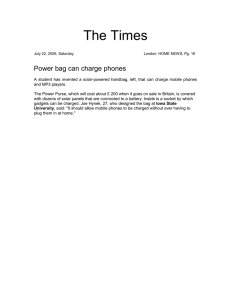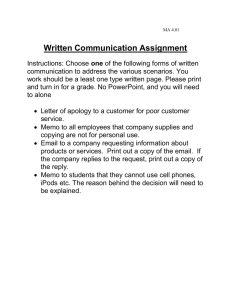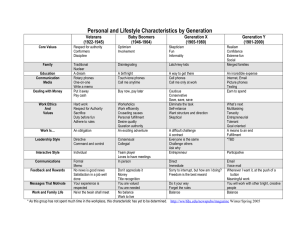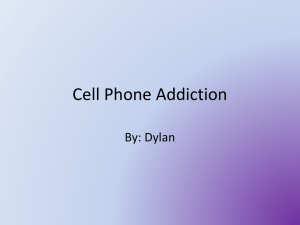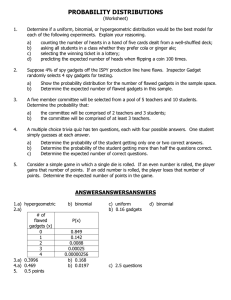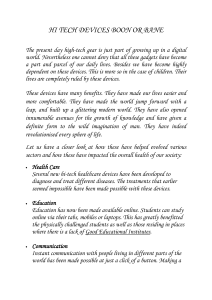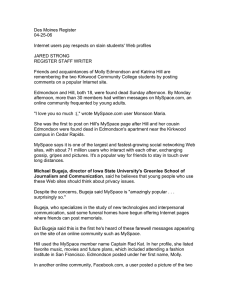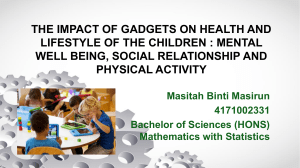Des Moines Register 11-14-06 Intended to connect us, technology divides instead
advertisement
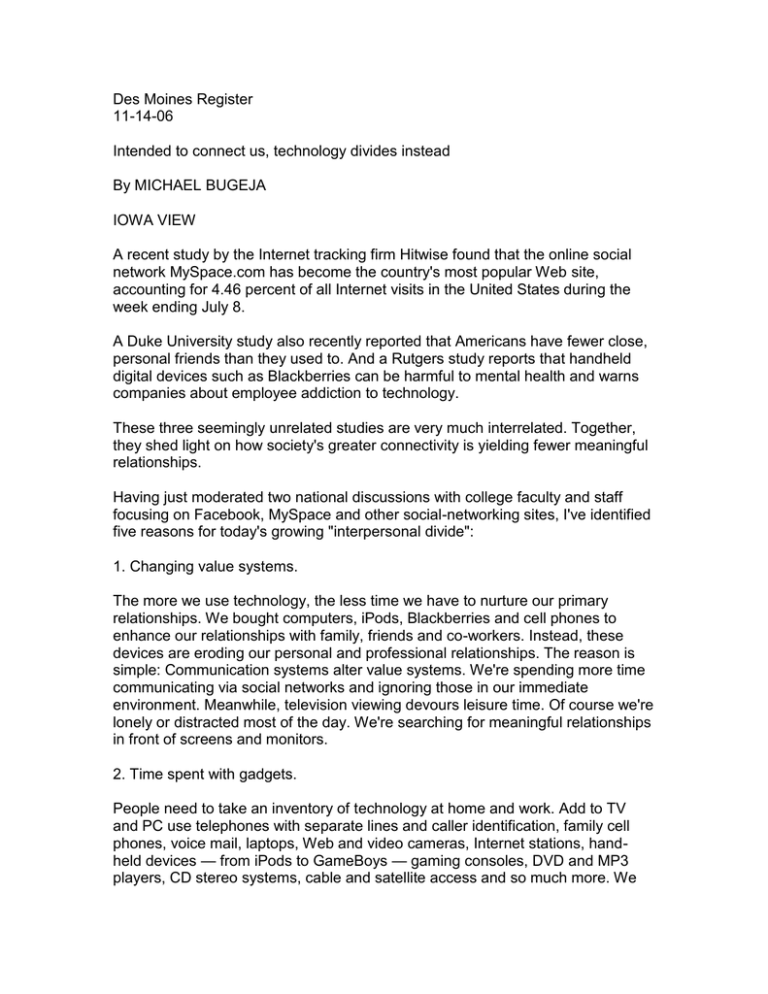
Des Moines Register 11-14-06 Intended to connect us, technology divides instead By MICHAEL BUGEJA IOWA VIEW A recent study by the Internet tracking firm Hitwise found that the online social network MySpace.com has become the country's most popular Web site, accounting for 4.46 percent of all Internet visits in the United States during the week ending July 8. A Duke University study also recently reported that Americans have fewer close, personal friends than they used to. And a Rutgers study reports that handheld digital devices such as Blackberries can be harmful to mental health and warns companies about employee addiction to technology. These three seemingly unrelated studies are very much interrelated. Together, they shed light on how society's greater connectivity is yielding fewer meaningful relationships. Having just moderated two national discussions with college faculty and staff focusing on Facebook, MySpace and other social-networking sites, I've identified five reasons for today's growing "interpersonal divide": 1. Changing value systems. The more we use technology, the less time we have to nurture our primary relationships. We bought computers, iPods, Blackberries and cell phones to enhance our relationships with family, friends and co-workers. Instead, these devices are eroding our personal and professional relationships. The reason is simple: Communication systems alter value systems. We're spending more time communicating via social networks and ignoring those in our immediate environment. Meanwhile, television viewing devours leisure time. Of course we're lonely or distracted most of the day. We're searching for meaningful relationships in front of screens and monitors. 2. Time spent with gadgets. People need to take an inventory of technology at home and work. Add to TV and PC use telephones with separate lines and caller identification, family cell phones, voice mail, laptops, Web and video cameras, Internet stations, handheld devices — from iPods to GameBoys — gaming consoles, DVD and MP3 players, CD stereo systems, cable and satellite access and so much more. We leave home and go to work and use the same gadgets again. Many of us, including students, are depressed because of stress or addiction. We seek selfhelp using the same digital gadgets that are the source of our problems, visiting Web sites or social networks instead of resolving issues interpersonally, face to face. 3. Digital displacement. Technology displaces people. On campus you hear people in restrooms using cell phones to make a date or break up. Helicopter parents telephone their sons and daughters throughout the day, forgetting that such an intrusion displaces us to the extent that many lie. Students say, "I'm on my way to the library to study," when they are really heading to a bar. The assumption of stronger family ties based on frequency of contact fails to factor in the falsehoods of digital displacement. 4. Accumulated effect of mediated communication. We are seldom out of touch with anyone anywhere anymore. Instead of falling into the "digital divide," we've fallen into an interpersonal one instead. An electronic gadget or portable computer offers instantaneous access to family, friends and colleagues, and yet, despite such contact, we feel empty unless we have a device in our hand as a crutch. The more devices, the better we should feel. But like obsessive shopping, such activity only masks something deeper denied within. We are losing the ability to interact meaningfully with others, face to face, because we opt for on-demand rather than physical contact, relying on technology to mediate our thoughts, words and deeds. And we pay a price, not only in access fees but in feelings. 5. Squandered time. We use cell phones while driving in rainstorms, chatting with friends while our toddlers are in the backseats of vans being entertained by Disney DVDs. We are teaching our children to elevate convenience, which technology can provide, over substance, which it cannot. Technology promised to give us a global village. Instead, we got a global mall. The medium no longer is the message. It's the moral, too. MICHAEL BUGEJA is director of the Greenlee School of Journalism and Communication at Iowa State University.

